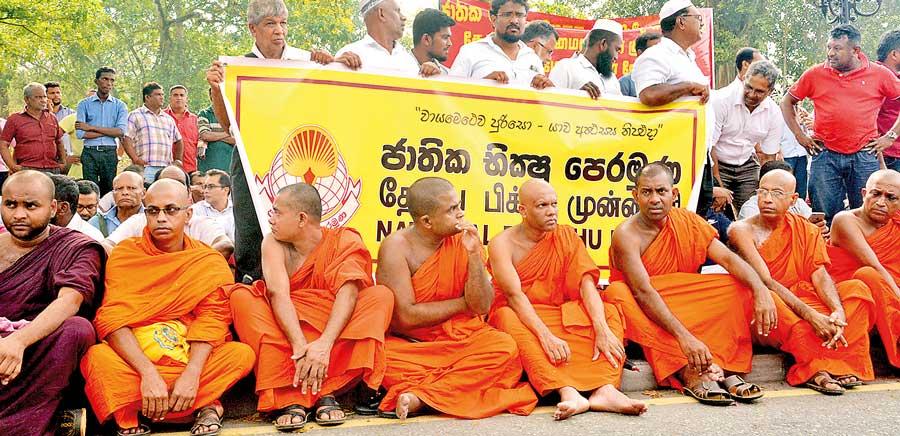Reply To:
Name - Reply Comment
Last Updated : 2024-04-19 08:31:00

 In the Lanka Guardian of March 15, 1979, Regi Siriwardena posed a question which I feel is pertinent for what it says and does not say about the issue it revolves around: “Where are the radical Buddhists?” Siriwardena’s stance was, I believe, clear: there was never a radical social protest movement engendered and led by monks, for the simple reason that the clergymen’s main interest was in protecting their order from outside encroachment. Kumari Jayawardena, in a series of thought-provoking replies to Siriwardena, contended that the Buddhist clergy had historically sided with the poor, if not to bring about a revolution, then at least to oust the colonial order. For Siriwardena, however, even the latter argument was unconvincing: cases of low-country monks affirming colonialism (H.L. Seneviratne’s study of Vidyodaya priests, particularly Kalukondayawe hamuduruwo, merits special attention here) were not unheard of, especially in the mid-19th century when it looked expedient for them to do so.
In the Lanka Guardian of March 15, 1979, Regi Siriwardena posed a question which I feel is pertinent for what it says and does not say about the issue it revolves around: “Where are the radical Buddhists?” Siriwardena’s stance was, I believe, clear: there was never a radical social protest movement engendered and led by monks, for the simple reason that the clergymen’s main interest was in protecting their order from outside encroachment. Kumari Jayawardena, in a series of thought-provoking replies to Siriwardena, contended that the Buddhist clergy had historically sided with the poor, if not to bring about a revolution, then at least to oust the colonial order. For Siriwardena, however, even the latter argument was unconvincing: cases of low-country monks affirming colonialism (H.L. Seneviratne’s study of Vidyodaya priests, particularly Kalukondayawe hamuduruwo, merits special attention here) were not unheard of, especially in the mid-19th century when it looked expedient for them to do so.
Religious movements and movements led by clergymen have a habit of combatting poverty and other social issues without questioning the structural basis for them. To take parallels in western history, leaders of the Protestant Reformation in Europe were ready to question and condemn political Catholicism but not to the extent of supporting peasant revolts in the regions they were popular and strong in. Even when leaders of the revolts turned out to be those otherwise allied with the Protestant movement, Luther and Calvin distanced themselves from them; Fernand Braudel thus distinguished between the militant Protestantism of the 16th century and the established Protestantism of the 18th. Like the Anti-Corn Law movement that split the Conservative Party between Tories and Whigs, it was a movement which appealed to a broad section of the population, yet fell into the hands of a bourgeoning industrial class who were as opposed to radicals as they were to monarchs and aristocrats.
Unless the State facilitates heavy-handed industrialisation, we are only going to have monks, along with clergymen from other faiths, issue statements which reveal their inability to grasp that which has conclusively been proved

The Buddhist clergy in Sri Lanka took a different route. In a country where the rulers and the clergy shared common interests and indeed where no sharp distinction was made between the spiritual and the temporal in matters of State, the Buddhist monk was both the benefactor and advisor. At the same time, from the time of the writing down of Buddhist texts on Ola leaves, they considered themselves, and in turn were considered, as more than just advisors to the State. Nissanka Malla’s decree that only a Sinhala and a Buddhist, of a particular high caste, could hold the reins of power, has been confused by scholars and nationalists on both sides of the ethnic divide, who appear blind to how words such as Sinhala, Buddhist and Tamil were constituted back then, or how the formation of something approximating to a modern State came about in that period of history. The truth stands that there were Sinhalese, Buddhists and non-Buddhists, and conformity to civilisational patterns invariably meant acceptance of the role played by ruler and monk: the twin peaks of the Sinhala State.
The question to be asked is one which intellectuals critiquing the involvement of Buddhist monks in secular affairs seem oblivious to: have we progressed, in any conceivable sense, as a modern State? Or in other words: has the modern conception of the State in Sri Lanka gone beyond its pre-colonial conception? Between the modern and the pre-colonial is the colonial, of course, so we can still further rephrase this question: did what transpire in the colonial era serve to take the economy and the country forward, or did it facilitate economic regression to such an extent that pre-colonial cultural patterns, habits, and beliefs, including the role played by Buddhist monks in affairs of State, were retained and sustained?
The question to be asked is one which intellectuals critiquing the involvement of Buddhist monks in secular affairs seem oblivious to: have we progressed, in any conceivable sense, as a modern State?
Colonial patronage was not alien to the Buddhist clergy, even at the time of the Dutch. By the end of Dutch rule, one year before the country fell to the British, we hear of Dutch ships used by low-country priests challenging the authority of the Kandyan clergy (of the Siyam Nikaya) and going on pilgrimages to South-East Asia to establish a new sect. The distinction between these sects were not that clear-cut, nor were they always opposed to one another; indeed, as Kitsiri Malalgoda puts it in his study of Buddhism during this period, laymen were as moved by geographic affiliations as they were by caste considerations when pledging their allegiance to one group over another: Govigama people in coastal areas, to give just one example, were more willing to donate alms to Salagama Amarapura Nikaya monks because the latter tended to hail from their villages. What we see here, naturally, is a feudal religious pattern, seen even in Europe (in the Middle Ages Catholic villages were identified with patron saints, such as St. Anthony of Padua, a custom discarded by the more urban Lutherans and Calvinists), being sanctioned by the colonial administration in the interests of trade.
What colonialism did, in other words, was destroy local industry while retaining feudal belief systems; the retention of the latter soon became essential to the destruction of the former. I am not of course suggesting here that superstition did not prevail before the advent of white colonialists, but the effect of their profiteering in this part of the world was to make, in more ways than one, superstition a dominant social and cultural pattern. How else can you explain attempts made by members of the Karava and Govigama bourgeoisie to trace their ancestry to the times of the kings – before colonialism – and to prove they were courtiers and important officials of the monarchy? The elite paid to have their histories published in Arnold Wright’sTwentieth Century Impressions of Ceylon; that shows to what extent the middle-class went to prove, to the people and to the world, that they were scions from a long line of distinguished noblemen hailing from even before the time of the Portuguese.
How does this explain the lack of a radical streak among Buddhist monks in Sri Lanka? In Sri Lanka, unlike many of the other countries quoted by the likes of Siriwardena in their critiques of the Buddhist clergy and their elevation to a superior moral and social position of Christian radicalism, industrialisation had never been allowed to happen. This was true also of India; as American journalist Will Durant put it, there would not have been an industrial revolution without India. To a lesser degree, this was true of our country also. In the absence of industry, we know what prevails and ends up being dominant are pre-industrial forms of behaviour and culture. The Buddhist monk in that context thus had to fight a battle with a two-edged sword: he wanted to do away with the colonial order which had entrenched Christianity, but solely to restore the country to a form of social organisation in which tribalism, superstition, and caste thrived; Marx would later term this the Asiatic mode of production.
Hence, we are faced with a particularly unenviable dilemma: whether we want to restore the State to that mode of production, or whether we want to take it forward. I hate to paint the problem in such stark black-and-white terms, but the point I’m trying to make is that we can’t even begin to understand the nature of that problem and the role played by monks (who, to be fair, have almost always been the first to stand against and protest growing encroachments on our sovereignty by global powers) in perpetuating it unless and until we take into account the lack of industrialisation in countries like ours that has enabled them to enjoy wide support in playing that role. We are living in a consumerist culture in which immediate self-gratification is considered to be the norm; in effect, the quick-sell Pettah merchant culture, where nothing is produced and everything is resold. The petty bourgeoisie from such a culture largely tends to be hostile to modernity, and approving of chauvinism and bigotry. Lack of industry, hence, has led to a quandary whereby those who imbibe Westernisation (the McDonald’s and Coca-Cola way) reject modernity and modernisation, generally condoning the statements and even actions of extremists from whatever ethnic or religious group.
This is where the English media in the country along with sections of the non-governmental sector as well as think-tanks devoted to the dissection of social maladies have failed: their inability to identify the link between the two. To put it succinctly, unless the State facilitates heavy-handed industrialisation, we are only going to have monks, along with clergymen from other faiths and denominations, issue statements which reveal, word to word, their inability to grasp that which has conclusively been proved. Let me make that clearer for you: it’s the sort of inability to grasp that makes them draw up a link, in a bizarre way, between drinking beer and being homosexual. Unfortunately, as long as we condemn monks for the popularity such critiques confer on us, without realising what led to the formation of an environment for them to issue bizarre statements of that sort, we are not going to go anywhere.

Add comment
Comments will be edited (grammar, spelling and slang) and authorized at the discretion of Daily Mirror online. The website also has the right not to publish selected comments.
Reply To:
Name - Reply Comment
On March 26, a couple arriving from Thailand was arrested with 88 live animal
According to villagers from Naula-Moragolla out of 105 families 80 can afford
Is the situation in Sri Lanka so grim that locals harbour hope that they coul
A recent post on social media revealed that three purple-faced langurs near t

10 Apr 2024
09 Apr 2024